PoliticsNow: China coal ban would breach WTO rules if true, Scott Morrison says
Scott Morrison says reports about China black-listing Australian coal are ‘speculation’, as he confirms the nation is set to beat its 2030 emissions targets.
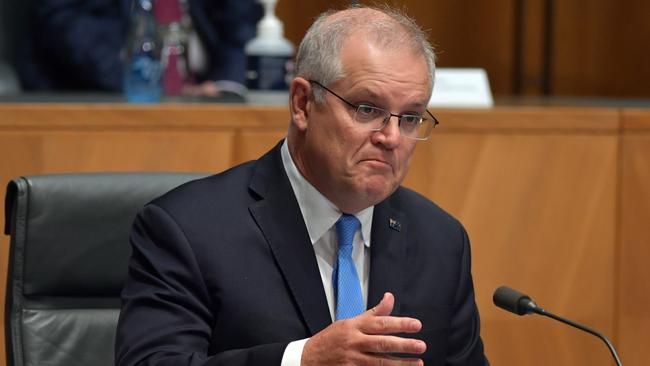
- China coal ban would ‘breach WTO rules’: PM
- China coal ban 'discriminatory’
- China demands ‘please explain’ over iron ore
- UK finds new, fast spreading strain
- US starts vaccinations
Welcome to our rolling coverage of politics in Canberra and the nation amid the ongoing coronavirus pandemic. Scott Morrison says reports about China black-listing Australian coal are ‘speculation’, as he confirms the nation is set to beat its 2030 emissions targets. Trade Minister Simon Birmingham has urged China to clarify reports that it has banned Australian coal. Warning shots to BHP and Rio Tinto about a regulatory crackdown follows a move by Beijing that has all-but-formalised the black-listing of Australian coal.
Geoff Chambers, Patrick Commins 11.15pm: PM’s $1bn boost for aged care
Scott Morrison will inject an additional $1bn into the aged-care sector, supporting 10,000 new home care packages and bolstering nursing facilities hit by the COVID-19 pandemic.
The major spending item in this week’s mid-year economic and fiscal outlook comes ahead of the Royal Commission into Aged Care Quality and Safety handing down its final report in February and as overall spending on aged care is projected exceed $27bn in 2023-24.
The $850m home care package increases the overall number of places funded since the royal commission handed down its interim report last year to almost 50,000, at a cost of $3.3bn. With the number of Australians aged over 70 having increased by 28 per cent since 2012, home care packages are estimated to have spiked by more than 200 per cent.
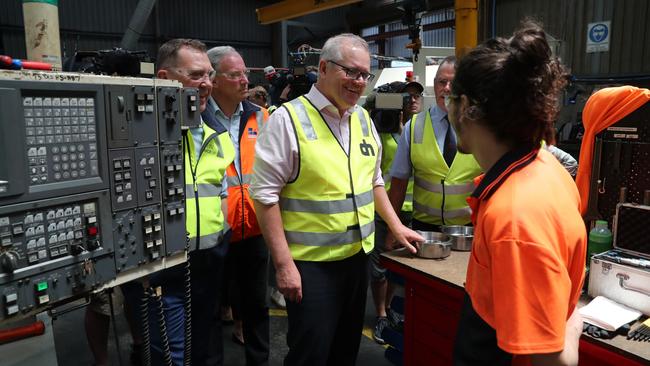
Sharri Markson, Jared Lynch 10.30pm: DFAT still using Beijing agency
Australia’s embassy in Beijing is using a Chinese government agency to recruit senior staff into the consulate, with intelligence insiders warning this practice is the equivalent of paying China to “put spies into our consulates”.
The Australian’s investigation exposing the infiltration of Chinese Communist Party members across foreign embassies and companies has triggered a warning from the US State Department of a “wide array of malign activities that the Chinese Communist Party undertakes to influence our societies”.
The Australian can reveal the Department of Foreign Affairs and Trade used the Beijing Service Bureau for Diplomatic Missions — a Chinese government-controlled agency — as recently as last month to hire a head of mission senior adviser and interpreter, reporting to Australian ambassador Graham Fletcher.
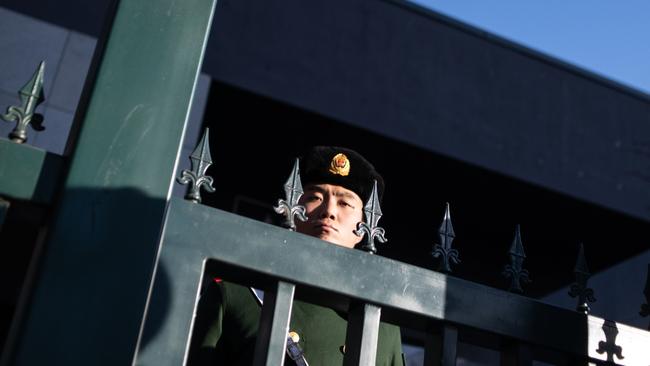
Geoff Chambers, Will Glasgow 9.45pm: China coal ban ‘an FTA breach’
Scott Morrison has hit back over an “all-but-official” Chinese boycott of Australian coal, warning it was a “lose-lose” situation that would breach the landmark free trade deal with Beijing and drive up carbon emissions.
The Prime Minister warned that the Australia-China relationship, which has sunk to its lowest levels since diplomatic ties were established nearly 50 years ago, must be built on mutual benefit and support the “economic performance of both countries”.
Amid trade threats and tariffs imposed by China against Australian products including wine, barley, beef, timber and lobster, senior ministers Simon Birmingham, Marise Payne and David Littleproud joined Mr Morrison in warning Beijing that a strike against coal would be in breach of both WTO and CHAFTA rules.
Yoni Bashan 9pm: Nats widen rift with move on Liberal seat
The NSW Nationals will sensationally break ranks with the Liberal Party and run a candidate against them in the seat of Port Macquarie at the next election, a decision that is likely to further inflame tensions between the coalition partners and one unprecedented in recent history.
Deputy Premier John Barilaro announced the move during a regional bus tour of the NSW mid-north coast electorate, accusing the Liberal Party of poaching their sitting Nationals member, Leslie Williams, and of calculated attempts to wreak havoc on the coalition partnership.
Ms Williams, the Port Macquarie MP, defected from the Nationals to the Liberal Party in September at the height of a feud within the Berejiklian government over koala habitats and planning policies.
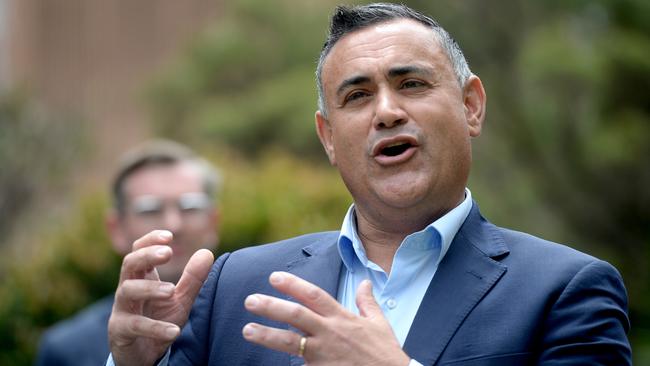
AFP 8.15pm: Singapore to allow business travellers from all countries
Singapore will allow business travellers and visiting officials from all countries to enter from next month as the financial hub seeks to recover from a coronavirus-induced downturn.
Under the new arrangements announced on Tuesday, a limited number of travellers can apply for stays of up to 14 days from mid-January, the trade ministry said.
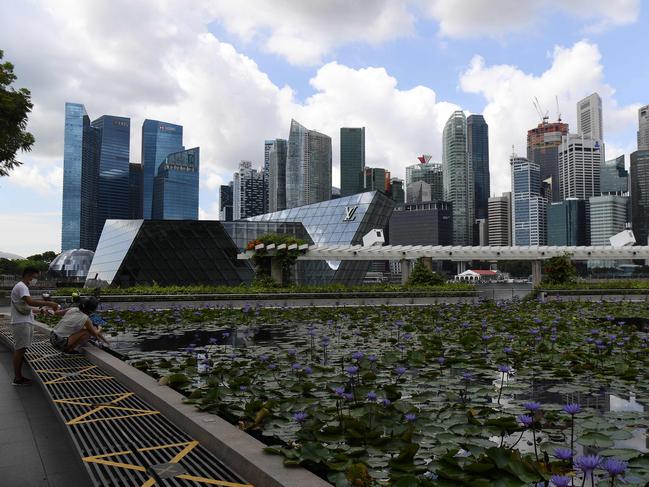
Singapore already had arrangements allowing in selected visitors from countries including China and South Korea, but the new scheme marks a significant easing of travel curbs.
There are strict conditions, however, for those wishing to visit the city-state, which has escaped the coronavirus relatively lightly.
Travellers must undergo virus tests before leaving their home country, on arrival in Singapore and regularly during their stay, and must reside and conduct meetings at locations selected by the government.
Arrangements are being made for visitors to hold meetings with their guests in specially designed meeting rooms outfitted with air-tight glass panels to reduce the risk of transmission, the ministry said in a statement.
The announcement came a day after Prime Minister Lee Hsien Loong warned the city-state had no choice but to ease restrictions or risk losing its status as a global hub.
“Trade and travel are our lifeblood,” he said.“The longer our own borders stay closed to travellers, the greater the risk of us permanently losing out as an international hub, consequently hurting our livelihoods,” he said.
Singapore’s economy has been plunged into recession by the pandemic, with international visitor arrivals falling to a mere 13,400 in October from 1.7 million in January, according to official data.
The city-state has reported some 58,000 infections and 29 deaths.
AFP 7.15pm: Putin congratulates Biden, says ready for ‘collaboration’
Vladimir Putin has congratulated Joe Biden on winning the US presidential election in November, saying he hoped the countries could set aside their differences to promote global security.
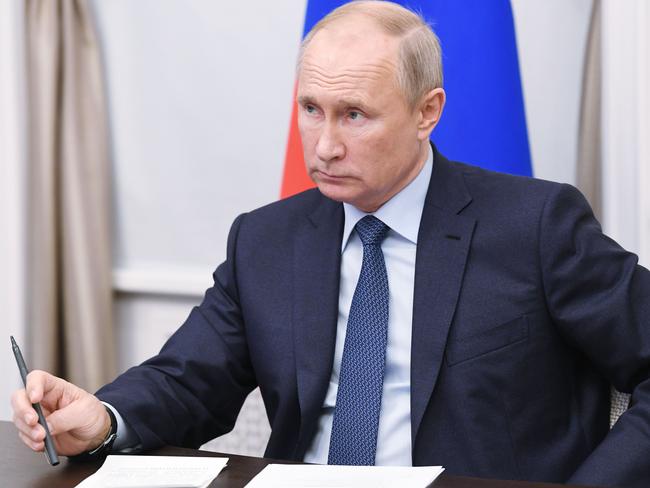
The Russian President wished theMr Biden every success and said that, “for my part, I am ready for collaboration and contacts with you,” according to a Kremlin statement.
Mr Putin was one of the last leaders of major world countries to have held back on congratulating Mr Biden, who was confirmed as the next US president by the Electoral College on Tuesday (AEDT).
Officials in Moscow, including the country’s elections chief and foreign minister, had earlier criticised the US elections process, describing it as archaic and not representative of the will of the people.
In his congratulatory telegram to the US president-elect, Mr Putin said their countries “bear special responsibility for global security and stability”.
He said he was confident that Russia and the US could, “despite their differences, really contribute to solving many problems and challenges that the world is currently facing”.
Mr Biden is expected to take a tougher stand against Russia than outgoing US President Donald Trump, who he slammed during the campaign for having “embraced so many autocrats around the world, starting with Vladimir Putin”.
Russia was accused of interfering in the 2016 US election to help get Mr Trump elected, in the hope he would take a softer line with Moscow.
READ MORE: Melania Trump looks to life after White House
Jill Rowbotham 6.28pm: School leavers opt for uni in uncertain market
Applications for university are up in four states as students seek shelter from the tough job market.
Tertiary admissions centres in Victoria, Queensland and South Australia are reporting 2 to 3 per cent rises over past year, and in the case of the University Admissions Centre, which covers NSW and the ACT, 5.7 per cent.
With no forecast increase in commonwealth-supported places, it is an open question how cash-strapped institutions reeling from the collapse of the overseas student market can afford to take them on board.
“I think it’s significant, particularly as the year 12 cohort in NSW was relatively the same as last year and there was a slight decrease in the ATAR-eligible cohort,” UAC general manager of marketing and engagement, Kim Paino, said of the rise in school leaver applicants to 48,657 so far this year, from 46,052 last year.
In Victoria, the number was 52,436, an increase of 2.1 per cent; in Queensland they were up 2.9 per cent to 30,073 and in South Australia they were up 3.21 per cent to 13,058.
Rosie Lewis 5.58pm: Public services still confusing, disrespectful
Up to one-third of Australians who dealt with the public service in the year to June said they were not treated with respect while more than 40 per cent said the information they received was not easy to understand, according to a survey conducted by Scott Morrison’s department.
The “Citizen Experience Survey” of more than 1500 Australians aged 18+ also found more people trusted and were satisfied with the federal public service compared to a year ago but only 51 per cent said it took an acceptable amount of time to reach an outcome.
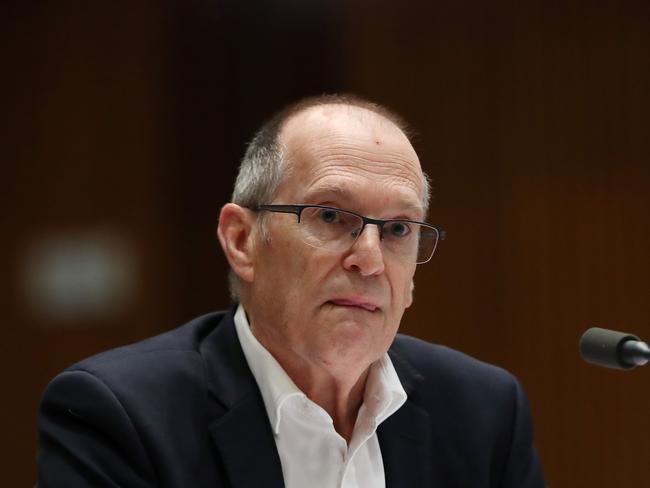
Published by the Department of the Prime Minister and Cabinet, the survey has measured Australians’ satisfaction, trust and engagement with public service delivery from March 2018 to June this year.
Emily Cosenza 5.52pm: Supermarkets put limits on sales of $20 lobsters
Coles will follow Woolworths’ lead in imposing a purchase limit on its half-price rock lobsters after the seafood began flying off shelves.
A limit of four lobsters per customer per transaction has now come into effect at Woolworths supermarkets nationally while Coles will bring in the same limit on Wednesday.
A Coles spokesperson said it was great to see so many customers wanting to support the local seafood industry.
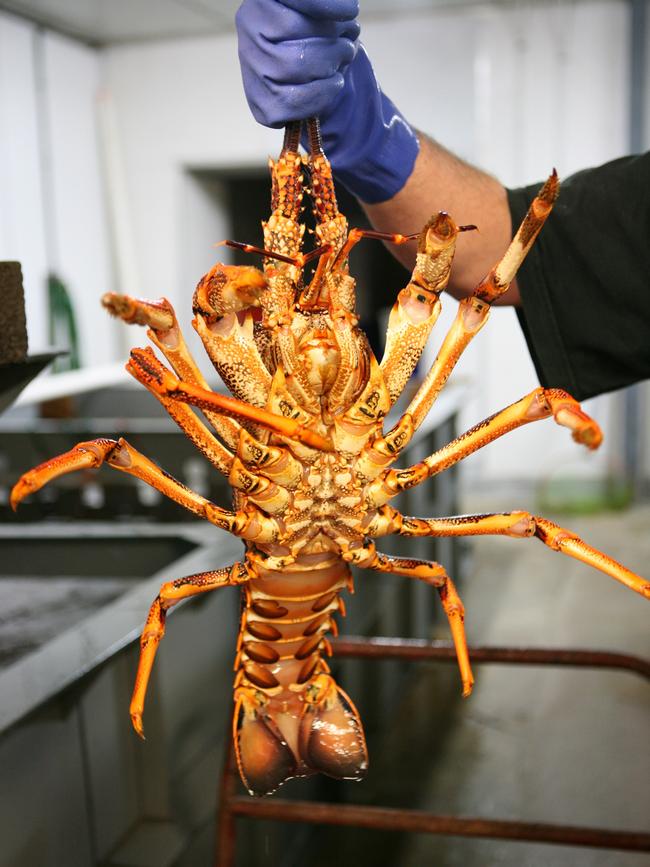
“Coles has an Australian first sourcing policy and we are proud to source seafood from across the country, particularly at a time when our suppliers are restricted in their ability to export their seafood,” they said.
“More lobsters will be arriving in our stores throughout the week and up until Christmas.
Woolworths and Coles both recently announced they were selling the half price WA rock lobsters after purchasing more than needed to help out fishermen who had their stock rejected by China.
Rebecca Le May 5.01pm: Houses to be in ‘oversupply’ by next year
The global COVID-19 pandemic has caused the biggest shock to population growth since early last century, triggering a forecast plunge in new demand for Australian housing over coming years.
That’s the key finding of the first report by the federal government’s newly-formed National Housing Finance and Investment Corporation research team, who have provided a picture of the projected housing supply and demand balance to 2025.
By then, almost one million fewer people than previously expected are predicted to be living in Australia, according to the report released on Tuesday.
But at the same time, low interest rates and government stimulus have caused a recovery in construction activity, and new supply is expected to exceed new demand by around 127,000 dwellings next year.
“Cumulative new supply is expected to be around 93,000 higher than new demand by 2025, although sensitivity analysis demonstrates this could halve with slightly more optimistic population growth assumptions,” the researchers say.
“Should international borders open sooner than expected, with migration resuming and more Australians returning home, coupled with potentially constrained housing supply, any cumulative excess supply over a medium-to-longer term horizon is anticipated to be negligible.”
Fewer households forming to soak up new supply over the near term is good news for renters, particularly in more densely populated eastern seaboard cities, as it should push prices down.
“There is likely to be downward pressure on rents in Sydney and Melbourne where vacancy rates are higher, which could improve overall rental affordability,” the researchers say.
They say that in the long term, however, the trends of declining affordability - particularly for low-income renters and prospective first home buyers able to transition to home ownership - will likely persist.
That’s why it is crucial for supply to respond to demand when it recovers and exceeds available dwellings, likely beyond 2023, the researchers say.
“The outlook for housing demand, supply and affordability is ultimately dependent on the reopening of international borders, the path of future population growth and the economic recovery, all of which are subject to an unusual degree of uncertainty,” the report concludes.
“In some respects, the projected excess supply over the next two years can be seen as partial catch-up for longer more protracted periods of undersupply.”
READ MORE: Be ready for a rate rise, warns billionaire
Melissa Iaria 4.14pm: The key to beating next pandemic
Real-time data is at the forefront of protecting the world from the next pandemic, a former UK chief medical officer says.
Dame Sally Davies is the convener of a coalition using data-driven research to better protect the world against health emergencies.
The initiative, named The Trinity Challenge, is led by some of the world’s most prominent organisations across the private and academic sectors.
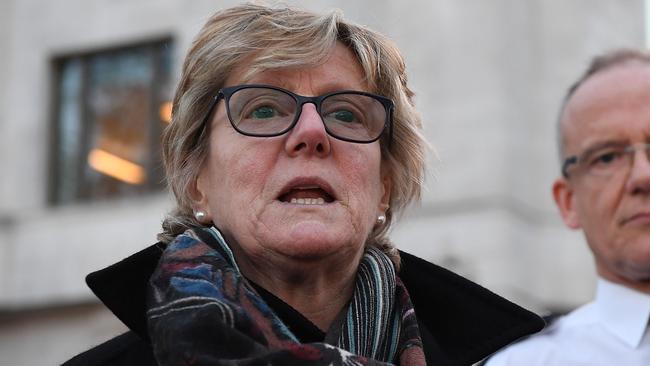
Dame Sally on Tuesday told a University of Melbourne conference the idea arose following discussions with colleagues in March about tackling the COVID-19 crisis.
“We started to ask ourselves what do we wish we’d done five years ago to put us in a better position so that we’d have picked it up early and it never spread?” she said.
She said science had moved forward through the use of data, yet the UK was behind.
“Britain was basing its response at least at the beginning of this on a 13-year-old flu model. We thought, ‘Maybe we could do better’.”
Read the full story here.
Patrick Commins 3.55pm: Economy adds 100,000 jobs in two weeks
Businesses took back on 100,000 employees over the two weeks to November 28, further evidence that the powerful post-COVID economic and associated labour market recovery has extended through to the end of the year.
Weekly payrolls figures from the Australian Bureau of Statistics showed the number of workers paid through the Taxation Office’s one-touch payroll system lifted by 0.4 per cent between mid and late November, against a 0.3 per cent rise over the previous two weeks.
Total wages paid increased by a solid 0.7 per cent, versus a gain of 0.1 per cent in the previous fortnight.
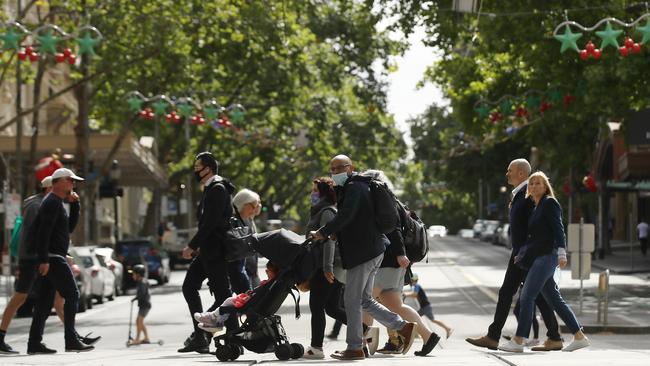
New South Wales led the national increase in payroll jobs over the two weeks to late November with a 0.6 per cent gain, while Victoria rose by 0.4 per cent. Queensland jobs were flat, while Tasmania outperformed, growing jobs by 1.1 per cent over the fortnight.
Read the full story here.
Jade Gailberger 3.19pm: Australia to beat 2030 emissions targets
Australia will beat its 2030 emission reduction targets through several energy projects without drawing on its carbon credits, Scott Morrison says.
The Prime Minister was expected to confirm the development at a climate summit over the weekend before he was snubbed from speaking.
Speaking in Tasmania on Tuesday, Mr Morrison announced that the federal and state governments had signed a new deal that will give the green light to two energy projects.
They include a 1500MW capacity Marinus Link interconnector between Tasmania and Victoria, and a pumped hydro site.
“This project will be contributing to Australia achieving and beating our 2030 emissions reduction targets, without even having to draw on our carbon credits, which Australia rightfully earned through our overachievement of the Kyoto commitments,” Mr Morrison said.
“This is a key part of our plan along with Snowy Hydro, up on the mainland.
“This is how you reduce emissions.”
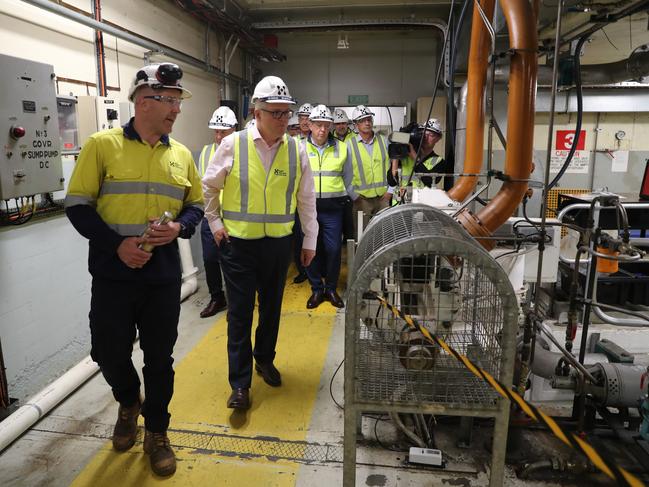
Under the new agreement, the Morrison government will contribute a further $93.9m for the Marinus Link project.
They have also agreed to progress the underwriting of a $650m pumped hydro project at Tarraleah, titled “Battery of the Nation”.
“Marinus Link will provide the additional interconnection needed to export the electricity generated by the Battery of the Nation projects to the mainland,” Energy Minister Angus Taylor said.
“It will unlock a pipeline of new renewable energy investment, including pumped hydro energy storage.”
A corporation joint-owned by the Commonwealth and Tasmania has also been established to keep the Marinus Link project going until a final decision is made on investment.
The projects are expected to create 2800 jobs which will be vital to the state’s recovery from the COVID-19 pandemic.
Tasmanian Premier Peter Gutwein said the memorandum of understanding between the state and federal governments would unlock more than $7 billion in economic activity.
“It will help us achieve our target to double our renewable generation to 200 per cent of our current needs by 2040,” he said.
State Energy Minister Guy Barnett said increased energy interconnection between mainland Australia and Tasmania would improve energy security and put downward pressure on power prices.
READ MORE: PM right to shun Boris’ Deep Green Club
Adeshola Ore 1.18pm: Government dragging its feet on China: Husic
Opposition agriculture and resources spokesman Ed Husic says Australia needs a “game plan” for trade diversification amid worsening relations with China.
Scott Morrsion said the federal government was seeking to clarify reports in the Chinese state-owned media outlet Global Times that Beijing has blocked Australia’s coal exports.
“The pressure is on the government to apply the energy, come up with the answers, protect jobs,” Mr Husic said in Sydney.
Mr Husic accused the government of dragging its feet over developing a response to the deteriorating trade relationship with China.
“The Coalition has known this for some time. They’ve been in power for seven years,” he said.
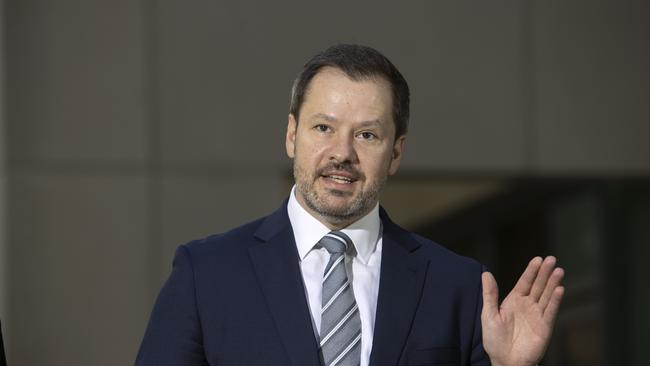
“Everyone can tell where this is going, but the Coalition seems to be slow in developing something longer term. Now we’re running out of time.”
Mr Husic said diversifying trade in Australia’s agriculture industry was crucial.
“We’ve put a lot of eggs into the one basket. We now need to find out what we can do differently.”
Mr Husic said the federal government needed to work with the coal industry to identify new markets.
“For example, India, Bangladesh, Vietnam are all markets where we’ve got some prospects of being able to export to, but again what’s the game plan from the government on this? We seem to be getting a lot of words and not much action out of this.”
READ MORE: Downer cautions business on China
Robert Gottliebsen 12.50pm: China is due a trade warning
China is having a ball by hitting out hard at what it regards as an incompetent government in Canberra. There is no respect for Australia and, as a result, Beijing is now looking around for other areas where it can have some fun.
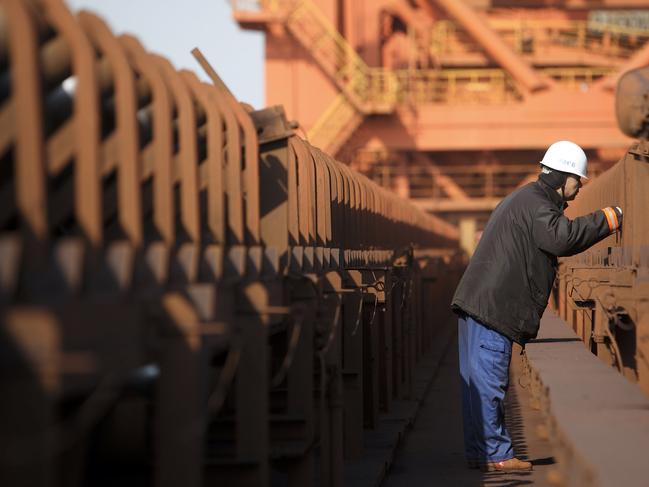
And according to reports in the South China Morning Post, wool is being considered as the next target. What Chinese in Beijing don’t realise is that anti-China anger in Australia is now reaching fever point. We don’t like being taken for patsies. If the Chinese attack wool then the community pressure on the Australian Government to respond, and respond hard, will be immense.
The community will demand that we explain to the Chinese government that if they attack wool then the days of having iron ore prices below $US200 a tonne will be well and truly over.
I want to emphasise that I would hope that such a step is not made necessary. But we need to prepare for it.
READ Robert Gottliebsen’s full article
Angelica Snowden 12.15am: No new locally-acquired cases in NSW, Victoria and SA
COVID testing in NSW continues to remain at low levels, as the state recorded a 12th straight day of no new locally acquired cases.
Just 5,333 people were tested in the state overnight on Tuesday, compared with 6173 tests reported overnight on Monday.
NSW Health said the low testing figures remained a “concern”.
NSW recorded no new locally acquired cases of COVID-19 in the 24 hours to 8pm last night.
— NSW Health (@NSWHealth) December 15, 2020
Five cases were reported in overseas travellers. This brings the total number of cases in NSW since the start of the pandemic to 4,461. pic.twitter.com/1KeHIe2oyt
“There is no room for complacency with restrictions eased, borders having opened, and school holidays and Christmas being less than two weeks away,” NSW Health said in a statement.
“NSW Health reminds people that, regardless of low case numbers, we must remain vigilant against COVID-19; experience has shown us how easily the virus can spread through the community if we let down our guard.”
It came after Victoria also recorded no locally acquired COVID-19 cases for the 44th day in a row, out of 8296 tests.
No new cases were reported in South Australia out of 1587 tests.
READ MORE: First vaccines given to US public
Perry Williams 11.15am: China coal ban would ‘breach WTO rules’ if true: PM
Scott Morrison says reports about China black-listing Australian coal are “media speculation”, but stressed that the government was committed to resolving trade disputes through an open dialogue.
“We take official information from the Chinese government so that’s what we’re seeking clarification of. Those reports have not been clarified by the Chinese government,” The Prime Minister said in Launceston on Tuesday.
“If that were the case, that would obviously be in breach of WTO rules and our own free-trade agreements so we would hope that it is not the case.”
Mr Morrison said Australia’s thermal coal exports have a “diverse customer base”.
“China is not our biggest market for thermal coal. That is, in fact, Japan which is more than double the exports we have to China,” he said.
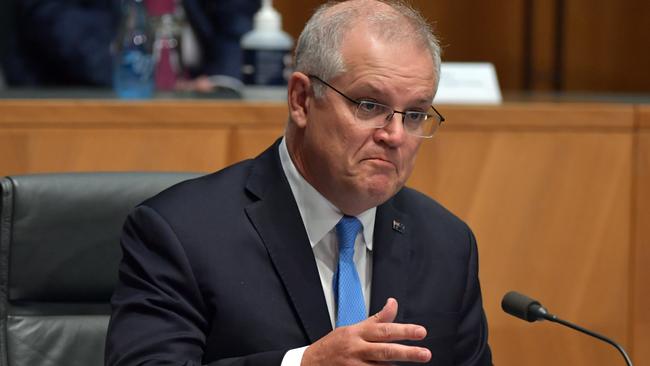
“Obviously we take these issues very seriously and if this were to be the practice, the $4bn that goes into coal-fired power generation, it really is a lose-lose here.
“The other countries have 50 per cent higher emissions than Australia so that would be a bad outcome for Australia. It would be a bad outcome for the trading relationship between Australia.
“I would hope we could get to the point of having mature discussions about these issues.”
READ MORE: China makes Australian coal blacklist official
Perry Williams 11am: Resolve ban, use rules-based system: Minerals Council
Australia and China must resolve a coal ban and use a rules-based system to restore stability to their trading relationship, the Minerals Council of Australia said.
Beijing formalised the black-listing of Australian coal to the world’s biggest energy consumer on the weekend, devastating the $14bn trade between the two nations.
“The MCA is aware of media reports from China that coal exports from Australia face further restrictions,” Minerals Council chief executive Tania Constable said.
“The success of this relationship has relied on a rules-based trade system, which has supported many years of economic growth and job creation, especially in Australia’s regions.
The MCA encourages the Australian and Chinese governments to work together to resolve these issues and restore stability to the long-term trading relationship.”
The coal standoff caps a rocky few days for Australia’s big commodity exports with its two biggest iron ore producers, BHP and Rio Tinto, also called in for a dressing down by China’s steelmakers seeking an explanation over high prices.
READ MORE: China makes Australian coal blacklist official
Adeshola Ore 10.55am: ‘Battery of the nation’ will help lower emissions: PM
Prime Minister Scott Morrison says the federal government’s plan to create the “battery of the nation” in Tasmania will help lower emissions.
The federal government has signed a energy and emissions reduction deal with the Tasmanian government, including $94m to build a second power interconnector to Victoria. The funding will take the $3.5bn proposed “Marinus Link” interconnector to a final investment decision stage.
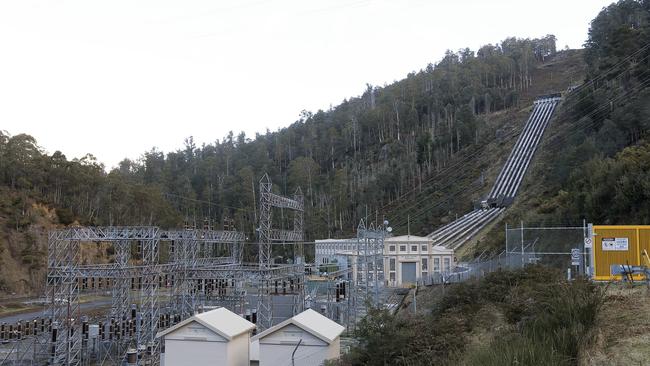
“Here in Tasmania, you will be an exporter of clean energy,” The Prime Minister said in Launceston on Tuesday.
“This is how you reduce emissions. This is how you actually get it done.”
READ MORE: PM’s $94m to charge battery of the nation’
Adeshola Ore 10.15am: China coal ban ‘discriminatory’: Birmingham
Trade Minister Simon Birmingham has urged China to clarify reports that it has banned Australian coal, warning such action is discriminatory and would breach trade agreements between the two countries.
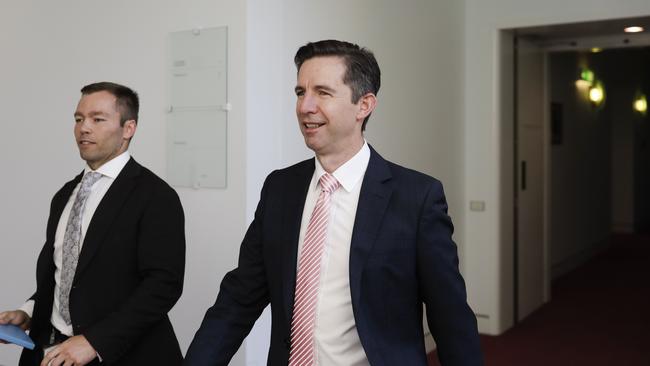
Overnight, the Chinese state-owned media outlet Global Times reported that Beijing had blocked Australia’s coal imports.
“The easiest way for China to deal with this is to simply make it clear that it’s not true,” Mr Birmingham said in Sydney.
“We remain willing to engage in dialogue to resolve these issues together and we urge China to clarify them, to reject the reports that have been made and to ensure that businesses who engage on a commercial basis can sit down and work with us in relation to the issues so we can avoid any type of legal processes like the WTO,” he said.
Mr Birminghan said Australia’s formal action against China’s barley tariffs was “imminent.”
“We’re close to making a final decision in that regard,” he said.
Mr Birmingham said he is hoping to avoid having to take legal action about reports of China black-listing Australian coal.
He said in the resources sector China was using state influence to disrupt trade.
“Clearly they are more opaque in terms of the potential practices that are being deployed there. We will seek to get to the bottom of this,” he said.
“Ultimately, Australia has long been clear in the system that it has welcomed China’s economic growth and that we value being a partner in China’s economic growth.”
Mr Birmingham said China needed to “speak plainly” about what was behind its actions rather than communicating via “anonymous drops to journalists from an embassy”.
READ MORE: China can play long game in trade row
Angelica Snowden 9.49am: Two-visitor aged care limit lifted in NSW
The two-visitor limit for aged care residents in NSW has been lifted, after a “heart wrenching” year which saw many families unable to unite with their loved ones.
NSW Premier Gladys Berejiklian said she was “pleased” health experts approved the move which will allow more families to visit their loved ones ahead of Christmas.
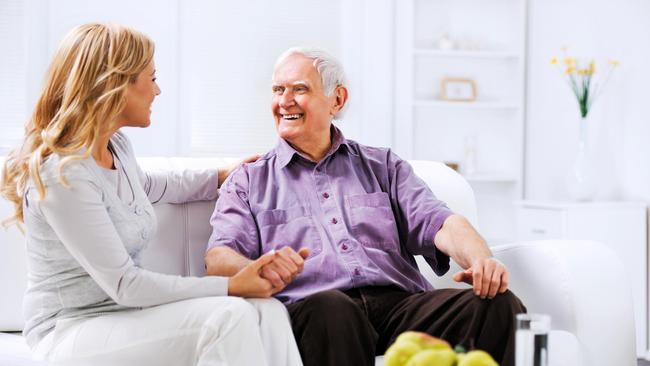
“I know how heartbreaking and heart wrenching it has been for families who have not been able to go and visit their loved ones in the way that they would like to in aged care facilities,” Ms Berejiklian told the ABC.
“I am really pleased that the health experts said that it is now OK to do that, especially leading up to this time of year,” she said.
“It helps to reduce a bit of the stress that everybody has been experiencing this year.”
READ MORE: Warnings over Christmas visits
Angelica Snowden 9.40am: Ambulance surge in Melbourne a ‘COVID hangover’
A surge in call-outs for ambulances in Victoria last night may be linked with a behavioural hangover from COVID-19, General secretary of the Victorian Ambulance Union Danny Hill says.
visit their local GP service if their illness is not an emergency.
— Ambulance Victoria (@AmbulanceVic) December 14, 2020
Our number 1 priority is to provide care to the sickest Victorians who require lifesaving assistance.
We thank the community + media for sharing this message + helping us save Triple Zero (000) for emergencies
“During the COVID environment people probably either haven’t been able to see their GP or haven’t been going to see their GP and the flow on effect is that things hit crisis point and people end up calling an ambulance,” Mr Hill told 3AW.
Last night Victorians who needed urgent emergency assistance did receive it, but due to a “extremely high” surge in demand for ambulances in Melbourne patients who required less urgent care experienced lengthy wait times.
A high number of non-urgent calls this evening has meant we have prioritised our ambulances for the most critically unwell Victorians. All Code 1 calls are receiving timely care. Many non-emergency cases being cared for by nurses and paramedics in our secondary triage service.
— Ambulance Victoria (@AmbulanceVic) December 14, 2020
Ambulance Victoria went to a “code red” under the state emergency health code response plan which was the “level we would have seen with thunderstorm asthma”, Mr Hill said.
“It was unprecedented in that it was tied to a massive surge in workload,” he said.
Mr Hill said Ambulance Victoria is relying on people working “massive amounts” of overtime
“Throughout COVID paramedics and patient transport ambos have been working the better part of the year in full PPE and they are emotionally and physically exhausted,” he said.
“When you have a big event like last night combined with paramedics who are too fatigued … it hits crisis point.”
READ MORE: 1000 properties prepare to evacuate
Angelica Snowden 8.50am: No more restrictions easing: Berejiklian
COVID-19 restrictions will not be eased any further ahead of Christmas in NSW as the state recorded another day of no community transmission, Premier Gladys Berejiklian says.
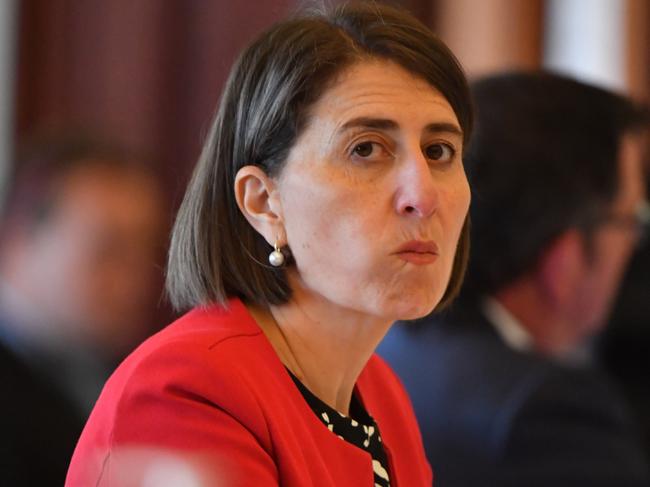
“I think what we’ve got is a really good sweet spot in NSW where we’re keeping the virus at bay and people are going to have a relatively restriction-free Christmas,” Ms Berejiklian told the Nine network’s Today show.
“I don’t know many people who have more than 50 people at their home for Christmas, maybe I’m wrong, but the limit of 50 people in your house I think is all well, plus we eased restrictions for people who want to eat out at restaurants, cafes and places like that,” she said.
Ms Berejiklian also confirmed there were no further cases of community transmission in NSW overnight.
“I just ask everybody to stay vigilant but I am really pleased as to where we are up to,” she said.
“I think people feel a relative level of freedom whilst being COVID-safe and businesses also have a bit of a boost with borders coming down.”
Under recent changes to COVID restrictions, NSW residents can now host up to 50 people in their homes.
Capacity of hospitality venues increased to one person per two square metres.
The public health order which said employers must allow employees to work from home was also lifted.
READ MORE: PM’s $94m to charge ‘battery of the nation’
Angelica Snowden 8.10am: New York nurse gets first US jab
The US kicked off its mass COVID-19 vaccination program, administering the first jab to a New York nurse.
Sandra Lindsay, an intensive care nurse in New York, is believed to be the first person to be given the Covid-19 vaccine outside of trial conditions in the US https://t.co/6vMUe1B4jQ pic.twitter.com/zxPmp42Oa5
— BBC News (World) (@BBCWorld) December 14, 2020
Critical care nurse at the Long Island Jewish Medical Center Sandra Lindsay was the first to receive the Pfizer-BioNTech shot, live on television.
“It didn’t feel any different from taking any other vaccine,” Ms Lindsay said.
“I hope this marks the beginning of the end of the very painful time in our history,” she added.
The landmark moment comes at one of the darkest phases of the pandemic, with infections in the United States and many other countries soaring, and health experts still struggling against vaccine scepticism, lockdown fatigue and uneven adherence to safety rules.
The US death toll has now surpassed 300,000, Johns Hopkins University has reported.
READ MORE : Homelessness, housing stress hit hard
Adeshola Ore 8.00am: Australia ‘very close’ to WTO action over China
Trade Minister Simon Birmingham says Australia is “very close” to taking formal action with the World Trade Organisation over China’s barley tariffs.
It comes after the Chinese state-owned media outlet The Global Times confirmed a ban on Australian coal imports. The Australian government raised concerns with the WTO about China’s targeted sanctions against Australian exports. But Mr Birmingham told the ABC the government was preparing to launch formal action.
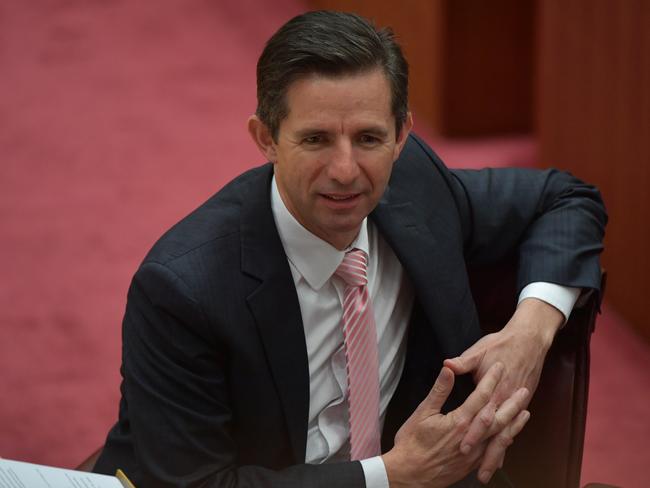
“We are very, very close in terms of finalising on the matter of barley and that is essentially the most imminent due to the nature of the action in finalising their dumping case in which we dispute the evidence and the findings they have made,” he said.
“We are well prepared in terms of the analysis we have undertaken to mount that case and in terms of finalising the case with Australian industries to move forward.”
Mr Birmingham said he was “deeply troubled” by the reports of China blocking Australian coal imports.
“If true, they would indicate discriminatory trade practices being deployed by Chinese authorities and we would urge them to rule them out.
READ MORE: ASIO zeros in on China arty games
Angelica Snowden 7.45am: Netherlands goes into hard lockdown for five weeks
The Netherlands is to go into its strictest coronavirus lockdown yet as the pandemic rages across Europe.
Schools and non-essential shops will close for five weeks over the Christmas period, Prime Minister Mark Rutte announced Monday.
Protesters could be heard whistling and shouting outside Mr Rutte’s office as he said in a televised address to the nation that action was needed to stem a surge in COVID-19 cases.
“The Netherlands will close for five weeks,” said Mr Rutte.
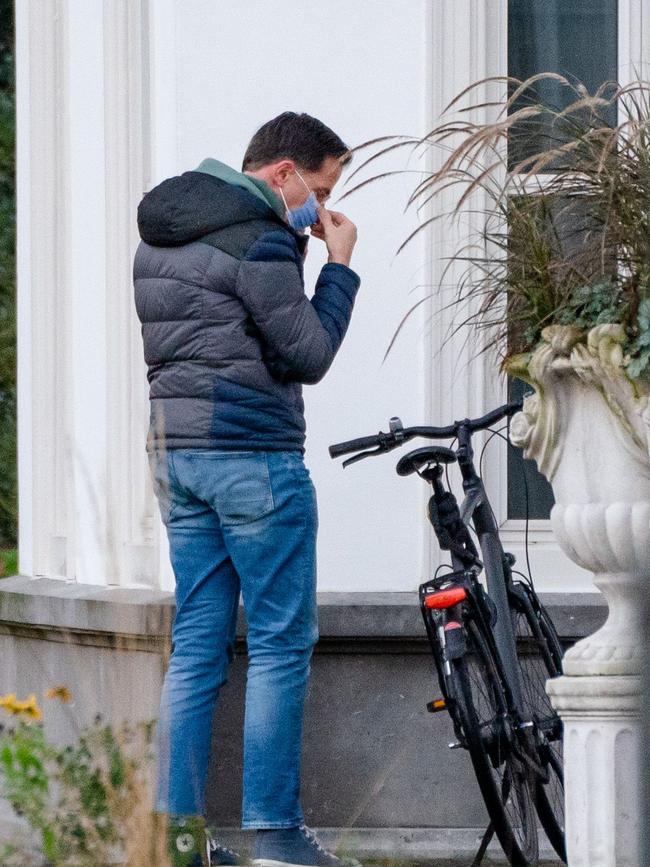
“We’re not dealing with a simple flu like the people behind us think,” he added in a reference to the noisy demonstrators.
All shops in the Netherlands except essential outlets like supermarkets, food stores and pharmacists must shut from Tuesday until January 19, while schools will close from Wednesday, he added.
People were advised to stay at home and can have a maximum of two guests a day, except for Christmas Day when they may have three.
Museums, zoos, cinemas and gyms must also close, the prime minister added.
But cannabis “coffee shops” and restaurants can both stay open for takeaway service, he said.
Until recently the Netherlands had some of the most lax virus measures in Europe but has struggled badly with the second and third wave of the disease.
The number of infections in the Netherlands is nearing 10,000 a day while the overall death toll during the pandemic passed 10,000 at the weekend.
The country saw a surge in cases in mid October when it recorded more than 11,000 cases on October 31.
The Czech government also said it would reimpose an overnight curfew and shut restaurants and bars for Christmas and Turkey said it would go into a four-day lockdown over the New Year holidays.
Across Europe nearly 200,000 COVID-19 infections were reported on Monday.
READ MORE: Warnings over Christmas visits
John Simpson 7.20am: Private schools stumble in Covid aftermath
Private schools in Australia thrive on certainty but, for many such institutions, COVID-19 has created a new normal that is shaking the foundations on which they have been built. This could mean the closure of more than a handful of schools unless they rapidly adapt. While also true for universities and state high schools, those institutions have governments behind them to help them weather the storm.
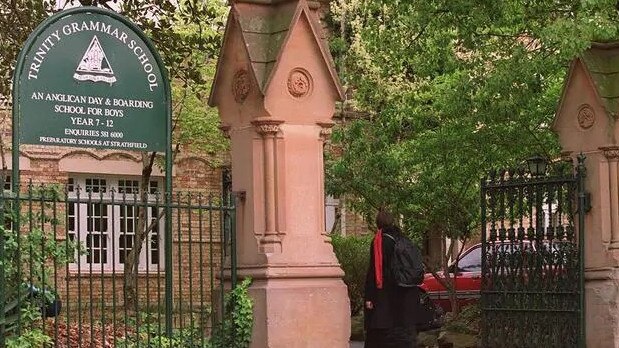
Including independent Catholic schools, almost 1150 of the 9500 schools in Australia are in the independent sector. Last year, they enrolled 16 per cent of the national student population, about 632,000 students. These schools matter. Independent schools are more vulnerable to disruption and shocks because they rely heavily, but not exclusively, on private resources to buttress the bulk of their operations.
The impacts in the independent sector have been real, painful and will certainly be long-lasting. As the vast majority of schools limp to the end of the year, it remains a distinct possibility that some private schools will not recover fast enough to continue operations once the full impacts of the pandemic become clearer next year.
Many independent schools, especially those with facilities that cater to high numbers of boarders, are finding the going tough and have been stunned by the shake-out COVID has caused. The old model of boarders, mostly coming from rural and regional areas of Australia, disappeared long before the pandemic. As with the university sector, many independent schools in recent years have adjusted their balance sheets to accommodate repeat patronage from international students, mostly from north and Southeast Asia. This trend gathered pace in the decade before COVID and the numbers of students involved is significant.
READ John Simpson’s op-ed in full
Judith Sloan 7.00am: PM right to shun Boris’s Deep Green club
Last week, independent member for Warringah Zali Steggall was all in a tizz about Australia’s failure to be invited to present at a virtual climate jamboree sponsored by the UK, France and the UN held this past weekend.
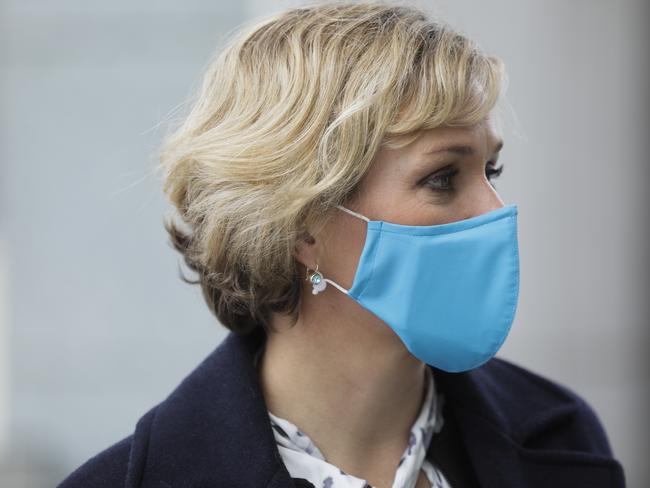
She didn’t bother to mention neither New Zealand nor Canada had been invited to present — although in all likelihood she thinks that these countries should be awarded elephant stamps because they have committed to net-zero emissions by 2050, and Saint Jacinda and Justin have both declared climate emergencies.
You see, committing to net-zero emissions by 2050 is the sine qua non for admission to the Global Deep Green Club of acceptable country behaviour. Without that commitment, people like Steggall will continue to scoff at her own country.
Call me old-fashioned, but I rate deeds much more highly than words. And vague intentions without a plan should just be dismissed. They might get you a speaking engagement at some intensely political shindig — but the rubber will really hit the road when it comes to specifying exactly how a country actually intends to achieve its net-zero emissions by 2050.
READ Judith Sloan’s op-ed article in full
Jason Douglas 6.30am: New, fast spreading strain identified in the UK
A new, fast-spreading variant of the coronavirus that causes COVID-19 has been identified in the UK.
Health Secretary Matt Hancock said more than 1,000 cases of the new strain have been identified in England. Initial analysis says the new strain is spreading more rapidly than existing variants of the virus.
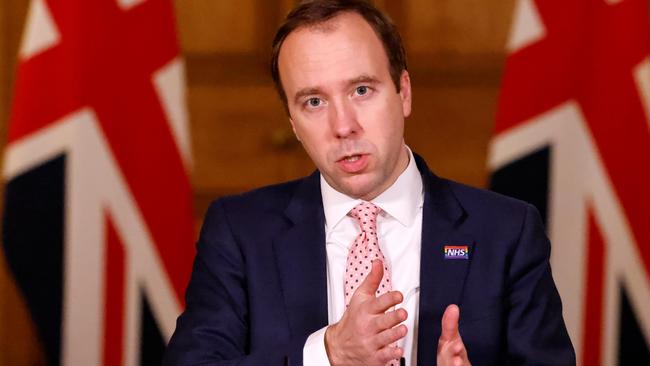
He said there is no reason to think the strain causes more severe illness or that vaccines would be ineffective against it.
“We have identified a new variant of coronavirus, which may be associated with the faster spread in the southeast of England,” Mr. Hancock told lawmakers in Parliament.
He said the U.K. has notified the World Health Organisation. Mr. Hancock also said the UK will tighten public-health measures in London to combat rising coronavirus cases in the capital.
He said London would be placed into the highest level of a three-tier system of restrictions from midnight Wednesday. It is currently in the middle tier.
In the highest tier, bars, restaurants and indoor entertainment venues must shut and people from different households are barred from mixing indoors, with narrow exceptions for family support networks of no more than two households. People from different households can meet outdoors in groups of no more than six. Stores remain open.
The move wasn’t a surprise. Cases are rising faster in London than many other parts of the country. The average number of new cases per 100,000 people over the seven days through Sunday was 274 in the capital, the highest case rate recorded in nine regions of England.
Mr. Hancock said parts of eastern and southeast England bordering London would also move into the highest tier.
Dow Jones
READ MORE: Private schools stumble in Covid aftermath
Will Glasgow 5.15am: Beijing demands ‘please explain’ on iron ore prices
Australia’s largest mining companies — BHP and Rio Tinto — have been asked to explain to Chinese steel manufacturers why their iron ore prices are so high as the surging $85bn export undermines Beijing’s eight-month trade retaliation campaign against the Morrison government.
Warning shots to the two mining giants about a regulatory crackdown follows a move by Beijing that has all-but-formalised the black-listing of Australian coal to the world’s biggest energy consumer, devastating the $14bn trade.
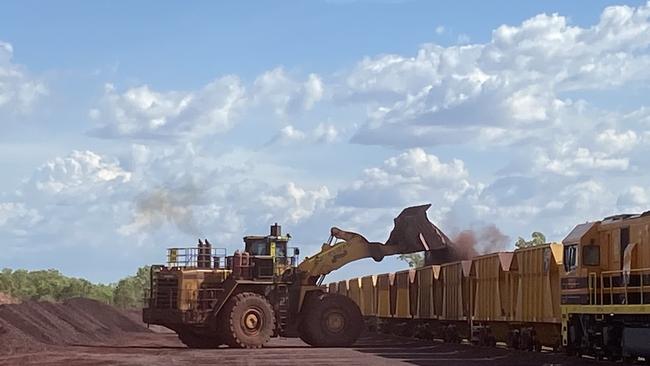
The latest coal trade strike takes the total amount of Australian annual exports blocked by Chinese port authorities, crippled by tariffs or banned by Customs to more than $20bn following hits to wine, wood, barley, meat and lobster.
A surging iron ore price — which in recent days has hit its highest levels in nine years — has frustrated Beijing’s campaign, pouring billions into the Australian government in tax revenue and swelling miners’ earnings while undermining the profitability of China’s steel industry.
The China Iron and Steel Association said the “iron ore pricing mechanism had failed” and its members were calling on Chinese regulators at the State Administration of Market Supervision and the China Securities Regulatory Commission to investigate iron ore prices and “severely crack down on possible violations of laws and regulations”. That threat saw iron ore tumble by nearly 5 per cent on Monday after prices of the commodity doubled since February, but experts said China’s claims of market failure were ill directed.
READ the full story
Agencies 5.00am: US rolls out vaccine, Germany locks down
Facing record levels of coronavirus, the US has begun shipping vaccine nationwide, launching a massive immunisation effort, while in Germany an explosion of cases has forced a return to partial lockdown.
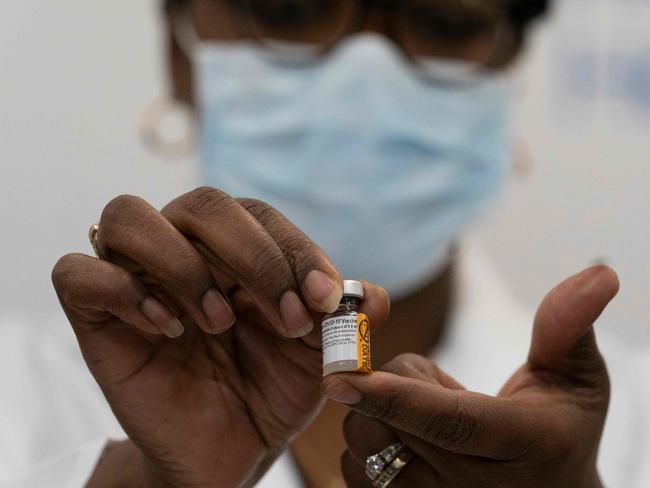
Delivery trucks with special refrigeration equipment rolled out of a facility in Kalamazoo, Michigan, as part of a public-private plan to ship millions of doses of the newly approved Pfizer-BioNtech vaccine to vulnerable Americans.
Delivery services are deploying fleets of trucks and planes to carry their precious cargo — sometimes under armed guard — to all 50 states, where healthcare workers and nursing-home residents will be first in line.
As the historical mobilisation unfolds, an initial 2.9 million doses are to be delivered by Thursday AEDT, with officials saying 20 million Americans could receive the two-shot regimen by year end, and 100 million by March.
Kentucky Governor Andy Beshear tweeted Sunday, “We now believe that the first individuals will be vaccinated” on Monday morning — less than 72 hours after the vaccine received emergency authorisation from the US Food and Drug Administration.
READ the full story
Greg Brown 4.45.am: Labor puts carbon targets on the agenda
Anthony Albanese would implement a medium-term, emissions-reduction target to put the nation on track for carbon neutrality by 2050, under changes to Labor’s draft policy platform.
With Labor locked in a contentious debate on climate change policy, the requirement for a medium-term target — likely to be set for 2030 or 2035 — will be reinserted into the draft platform through an amendment sponsored by Left faction heavyweight Mark Butler, the party’s energy and climate change spokesman.
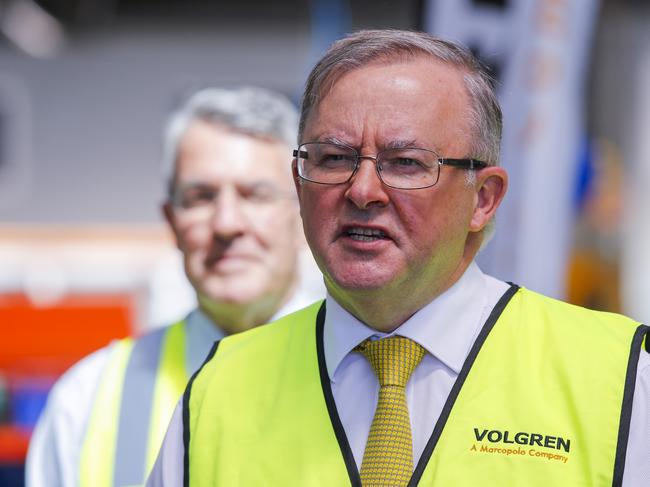
The draft policy platform will be discussed at Labor’s national conference which will be held over two days from March 30, The Australian can reveal.
The medium-term target in the draft platform is unspecified, unlike that taken to the last federal election when Bill Shorten was tied to a 45 per cent emissions goal by 2030. The preliminary draft platform, revealed by The Australian in September, made no mention of medium-term targets as Joel Fitzgibbon and blue-collar unions pushed for the party to focus instead on a net-zero emissions by 2050 goal.
READ the full story




To join the conversation, please log in. Don't have an account? Register
Join the conversation, you are commenting as Logout